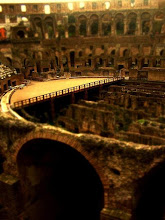FOUCAULT:
Foucault talks about hetertopias as if they are so limited and as if there are only so many ways to look at them, but can’t a hetertopia technically be anything? Depending on how a person relates to that object or place?
At the very end this quote really impacted me, especially because I believe the last words are so much more meaningful, as if that is what the author was trying to say the whole time; “The ship is the heterotopia par excellence. In civilizations without boats, dreams dry up, espionage takes the place of adventure, and the police take the place of pirates” . So does Foucault agree with heterotopias completely or not? He seems to go back and forth in a way, naming pros as well as an equal amount of cons.
“Getting in” to a heterotopia, he states is, “either the entry is compulsory, as in the case of entering a barracks or a prison, or else the individual has to submit to rites and purifications” and then continues on to state that there’s “simpler” ways to get in as well. Does that not include all ways to get in then? What makes a heterotopia’s enterance really unique then?
Regarding the previous question, wouldn’t any form of entrance or doorway be a hetertopia?
Lastly, it seems clear to me that Utopia’s in any form or looked at in any way, are impossible. Doesn’t that make the heterotopias the norm?
Yi-Fu Tuan
Holding a spoon, that spoon is now an extension of your body. This is what came to mind when I read Yi-Fu Tuan’s paper on space and place. Even though there is a spatial ability that supposedly is developed by babies and such when learning simple activities, does that mean that instinct is completely ruled out?
I feel like there is so much more than just “place” and “space” that putting them under those two topics is so broad and general. Tuan’s idea of space gives me the impression of just the physical your body experiences. Could that mean that there is no metaphorical space?
Tuan talked about place being a geographical idea. Can one not be in a certain “place” in their own mind?
Tuan touches upon the idea of the nature versus nurture issue, but I feel he avoids the question of which has the greatest influence on more or less the space and place of human beings, nature? Nurture? Or both together?
Considering space looked at in the way Tuan sees it more or less, would space be considered that Karma or an Aura can be seen in “space”?

No comments:
Post a Comment